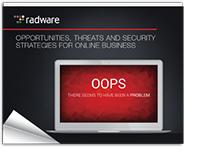Have you noticed all management systems promise the same value? Have you ever met a vendor who did not offer “advanced automation,” “flexible customization” and “granular visibility”?
The fact that all vendors promise the same values makes you doubt the necessity of their management consoles. After all, you are buying their solution for a certain purpose – whether for security, networking, virtualization or application. So do you really need that system?
The surprising answer is – it depends. It depends on what your expectations are, and depends on the management system’s ability to fulfill them.
Purchasing a new solution in the information-flood era is a sweat-producing task. For months you have been evaluating several solutions, testing various technologies and negotiating with clever sales reps on one hand and your strict procurement team on the other.
And then, right before you make your final decision and get some well-deserved relief comes your selected vendor, who tries to up-sell their management system. Do you really need it?

Here are five benefits you should be looking for in order to answer that question:
- Productivity
It is challenging to measure the ROI of IT investment in dollar value, but it is quite sensible in terms of the bandwidth of your staff. They should have more time dedicated to other tasks rather than operating that particular solution. In addition, you can measure how much time different tasks are taking when utilizing the management system compared to running them without it. For instance – 80% reduction of an application rollout, configuration of multiple devices, and turning manual tasks into a no-brainer, automatic task that takes just a few clicks, etc.
- Automation
Running dozens of solutions in your network can result in spending too much time on maintenance and troubleshooting. Your management system should help streamline the execution of complex operations and reduce the maintenance effort via scheduled tasks, auto-updates, and simplification of tedious tasks (for example – SSL certifications health check).
[You might also like: “POP” Goes the Vendor that Doesn’t Separate Scrubbing Centers from Always-On Platforms]
Automation gives you the following benefits, which you can easily evaluate:
- Accelerated productivity
- Reduction in human errors
- Elimination of the “know-how” dependency, allowing non-experts to maintain the operation via wizards
- Customization
Every environment is unique and challenging to orchestrate. It may take a few adjustments to make sure the new solution you invest in integrates well into the network. Does the management system have the flexibility you need? Are you able to extend its feature set to better match your network and your needs? Yes, these can refer to predicted capabilities such as customized reports, GUI, language and more. Can you write your own scripts and enjoy an interactive programmable platform? You should think specifically on what you expect the system to do, and based on that ideal model evaluate the solutions in front of you to learn which one best matches your ideal design.
- Visibility
Your number one goal is to manage and maintain the optimal operations of your service. But reality poses constant challenges to your ability to control the application performance and the user SLA experience. You need visibility to the software versions, applications and traffic patterns that are constantly changing. Your management system should help you keep up with these changes. Do you have a clear portal that intuitively tells you where your attention is required? Which changes have been made? What kind of real-time monitoring and historical reporting capabilities does it support? How deep can you drill down to learn from events that occurred? Are there any tools, tips and remediation recommendations? This is highly crucial when monitoring network security or application service level. You always need to control both and make sure they are at their maximum.
- Extras
The solution you implement interacts with many other solutions in the network. Can the management system sense and indicate when an interface slows down the network, or when an application service suffers from service degradation? Third party event notifications can indicate a smart management system that supports your workflows. This information can also help resolve responsibility disputes between the network, application and/or security teams.
Finally, as you have already decided to invest in a certain solution, why not get the most out of it? Many of these management systems extend the capabilities of the solution itself. You can assume the vendor conducted some research on network trends and future projections of integrated solutions. Trust them to develop management consoles capable of assuring the operation of their products so it will do what it is designed for, and will do it in the best way possible.
There is a lot of value you can get from a management system. You will enjoy more uptime, accelerated productivity and save OPEX. And hopefully, enjoy a simpler life.

Download our eBook "Opportunities, Threats and Security Strategies for Online Business" to learn more.
Download Now